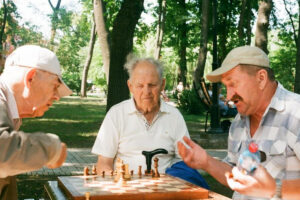What Role Does Social Interaction Play in Elderly Mental Health?
Imagine a world where a single conversation could brighten someone’s day, a simple touch could ease their worries, and a friendly smile could bring joy to their heart.
Social interaction is a lifeline, a beacon of hope, in elderly mental health. It is the key that unlocks the doors to emotional support, mental well-being, and a sense of belonging.
Join us as we explore the profound role of social engagement in our beloved seniors’ lives.
Importance of Social Interaction
As an older adult the social influences of older adults have a crucial role in maintaining your mental well-being. In today’s society, there’s a growing concern about the loneliness epidemic among older adults. Research has shown that social isolation can have detrimental effects on yoharmt regular social engagement, you’re at a higher risk of experiencing cognitive decline.
Loneliness can also lead to increased feelings of depression and anxiety, further exacerbating your mental health issues. On the other hand, engaging in social activities and maintaining strong social connections can have numerous positive effects on your mental health. Regular social interaction can help stimulate your brain, improve cognitive function, and provide a sense of belonging and purpose.
It’s essential to prioritize social interactions in your daily life to support your mental well-being as you age.
Benefits of Emotional Support
Emotional support can significantly enhance the mental well-being of elderly individuals. The role of companionship in providing emotional support can’t be overstated. Having someone to talk to, share experiences with, and spend time with can significantly improve one’s overall quality of life.
Companionship helps combat loneliness and isolation, which are common among older people. It creates a sense of belonging and connection, making you feel valued and understood.
Moreover, emotional support has therapeutic benefits. It can reduce stress, anxiety, and depression and even improve cognitive function. Research has shown that individuals receiving emotional support tend to have better mental health outcomes, including higher life satisfaction and unhappiness.
Impact on Mental Well-Being
Regular social interactions positively impact your mental well-being as an elderly individual, contributing to a sense of belonging and happiness.
As you age, you may experience a sense of isolation and loneliness due to various factors, including the stigma surrounding loneliness. However, connecting with others through community programs can help combat these feelings and improve your mental health.
Research has shown that participating in social activities and maintaining strong social networks can reduce the risk of developing mental health issues such as depression and anxiety.
Engaging in conversations, sharing experiences, and forming meaningful relationships with others can provide a sense of purpose and fulfillment.
Social Isolation and Mental Health
Regular social interactions are essential for maintaining good mental health as an elderly individual, as they help combat social isolation and its negative impact on well-being.
In today’s society, the prevalence of social isolation among older people has become a concerning issue, leading to a loneliness epidemic with significant mental health consequences. Research has shown a strong link between social isolation and mental health disorders, such as depression and anxiety.
When individuals lack meaningful social connections, they may experience feelings of loneliness, sadness, and a decline in cognitive function. Engaging in social activities and maintaining relationships can alleviate these adverse effects by providing a sense of belonging, purpose, and support.
Strategies for Promoting Social Engagement
To promote social engagement among older people and combat the harmful threats of social isolation, it’s important to encourage participation in various community activities. Here are some strategies that can help:
- Community Programs: Encourage seniors to join local community centers that offer a variety of activities, such as exercise classes, art classes, workshops, and group outings. These programs provide opportunities for interaction and foster a sense of blended purpose.
- Technology Solutions: Help seniors embrace technology by providing training and support to use social media platforms, video calling apps, and online forums. These tools can help them connect with friends and family, join virtual interest groups, and engage in online discussions.
- Volunteer Opportunities: Encourage seniors to volunteer their time and skills in their communities. This allows them to control a cause they care about, enabling them to meet new people and form meaningful connections.
- Intergenerational Programs: Promote intergenerational activities where older adults can interact with younger generations. This can be done through mentorship programs, reading initiatives, or shared hobbies. These interactions can provide a sense of purpose and joy for both generations.
- Support Groups: Facilitate support groups where seniors can share their experiences, concerns, and emotions with others who may be going through similar challenges. These groups provide a safe space for seniors to express themselves, receive emotional support, and build connections.
Implementing these strategies can encourage social engagement among older people and ensure they feel valued, connected, and supported.
Together, we can combat social isolation and promote better mental health for our beloved seniors.











